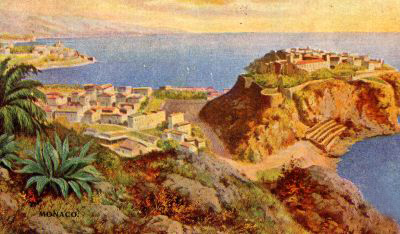
The politics of Monaco have traditionally been under the autocratic control of the Prince of Monaco, and from its founding the principality was a monarchy ruled by the House of Grimaldi; however, with the creation of a Constitution in 1911, the Prince relinquished his autocratic rule and the principality became a constitutional monarchy. Though he remains the head of state, some of his former power is now devolved to several advisory and legislative bodies.
Constitution of Monaco
A first Constitution of Monaco was adopted in 1911 and a new one, awarded by Prince Rainier III on December 17, 1962, outlines legislative, judicial, and executive branches of government, which consist of several administrative offices and a number of councils. Despite having relinquished some of his formerly absolute power, the Prince of Monaco remains head of state and retains most of the country's governing power; however, the principality's judicial and legislative bodies may operate independent of his control.
Country name:
conventional long form: Principality of Monaco
conventional short form: Monaco
local long form: Principauté de Monaco
local short form: Monaco
Data code: MN
Government type: constitutional monarchy
Capital: Monaco-Ville
Administrative divisions: none; there are no first-order administrative divisions as defined by the US Government, but there are four quarters (quartiers, singular - quartier); Fontvieille, La Condamine, Monaco-Ville, Monte-Carlo
Independence: 1297 (beginning of the rule by the House of Grimaldi)
National holiday: National Day, 19 November
Constitution: 17 December 1962
Legal system: based on French law; has not accepted compulsory ICJ jurisdiction
Suffrage: 18 years of age; universal
Executive branch:
chief of state: Prince ALBERT II (since 6 April 2005); Heiress Presumptive Caroline, Princess of Hanover, sister of the monarch (born 23 January 1957)
head of government: Minister of State Patrick LECLERCQ
cabinet: Council of Government is under the authority of the monarch
elections: none; the monarch is hereditary; minister of state appointed by the monarch from a list of three French national candidates presented by the French Government
Legislative branch: unicameral National Council or Conseil National (24 seats; members are elected by popular vote to serve five-year terms)
elections: last held in February 2003 (next to be held NA February 2008)
election results: percent of vote by party - NA; seats by party - Union for Monaco 21 - Rally for Monaco - National and Democratic Union 3
Judicial branch: Supreme Court or Tribunal Supreme, judges appointed by the monarch, some on the basis of nominations by the National Council
Political parties and leaders: Union for Monaco [Christophe SPILIOTIS] Rally for Monaco - National and Democratic Union or UND [Guy MAGNAN]
International organization participation: ACCT, ECE, IAEA, ICAO, ICRM, IFRCS, IHO, IMO, Inmarsat, Intelsat, International Criminal Police Organization - Interpol, IOC, ITU, OPCW, OSCE, UN, UNCTAD, UNESCO, UPU, WHO, WIPO, WMO, Council of Europe.
Source for this post: Wikipedia.org

0 Comments:
Post a Comment
<< Home